BBAL401 Company Law: Asic v Rich and Ors Case Study Analysis
VerifiedAdded on 2022/11/25
|7
|1779
|135
Case Study
AI Summary
This case study analyzes the case of *ASIC v Rich and Ors [2003] NSWSC 186*, focusing on the breach of director's duties under the Corporations Act 2001 (Cth). The case involves four directors of One.Tel, a telecommunications company, and examines their responsibilities concerning financial reporting and the best interests of the company. The analysis details the legal issues, rules, application of the law to the facts, and the court's conclusion, specifically highlighting the actions of Mr. Keeling. The judgment found Mr. Keeling in breach of section 180 of the Act for failing to act with due care and failing to monitor the financial situation of the company. The court disqualified Mr. Keeling from managing the affairs of a corporation for ten years. This case underscores the importance of diligent financial oversight and acting in the best interests of the company's stakeholders.
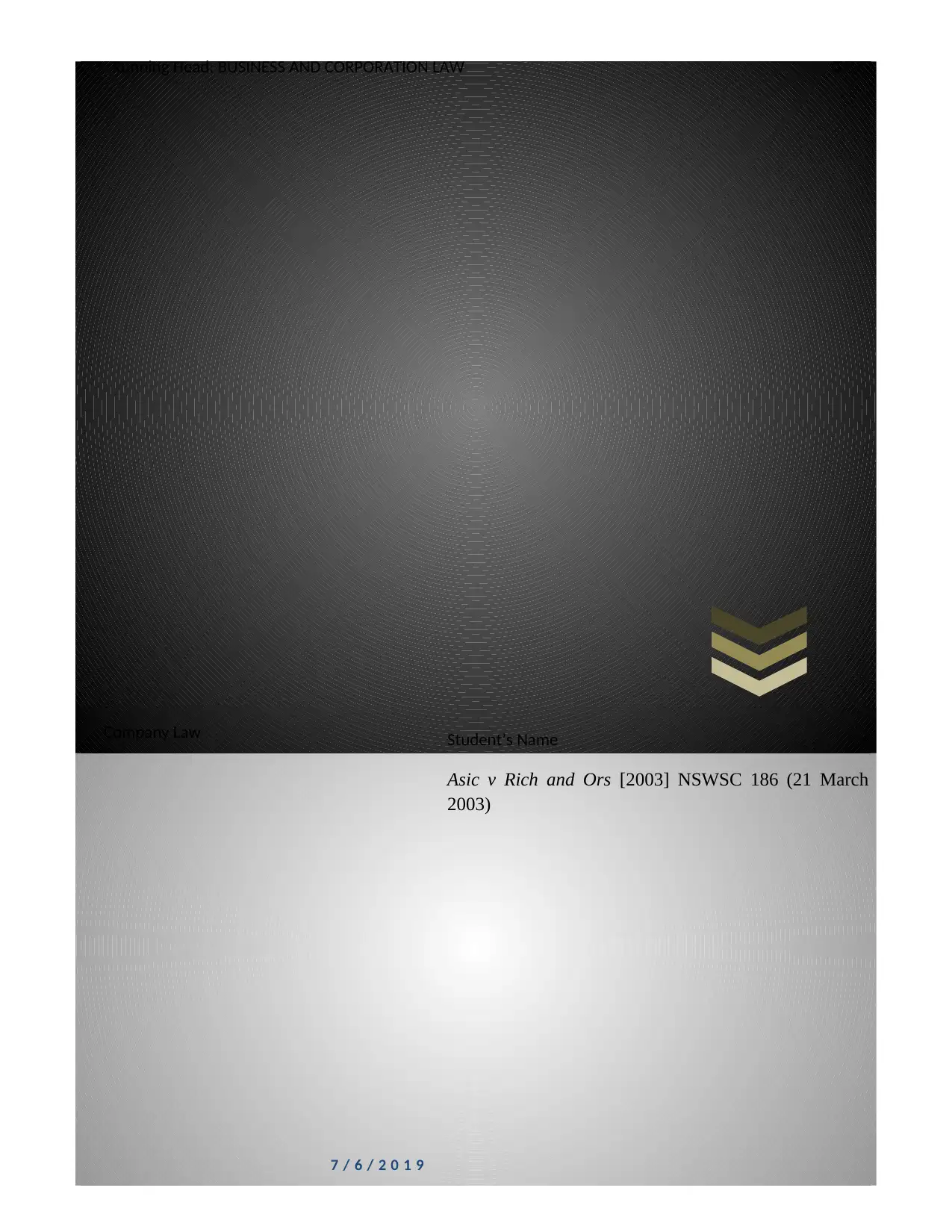
Company Law
Running Head: BUSINESS AND CORPORATION LAW 0
7 / 6 / 2 0 1 9
Student’s Name
Asic v Rich and Ors [2003] NSWSC 186 (21 March
2003)
Running Head: BUSINESS AND CORPORATION LAW 0
7 / 6 / 2 0 1 9
Student’s Name
Asic v Rich and Ors [2003] NSWSC 186 (21 March
2003)
Paraphrase This Document
Need a fresh take? Get an instant paraphrase of this document with our AI Paraphraser
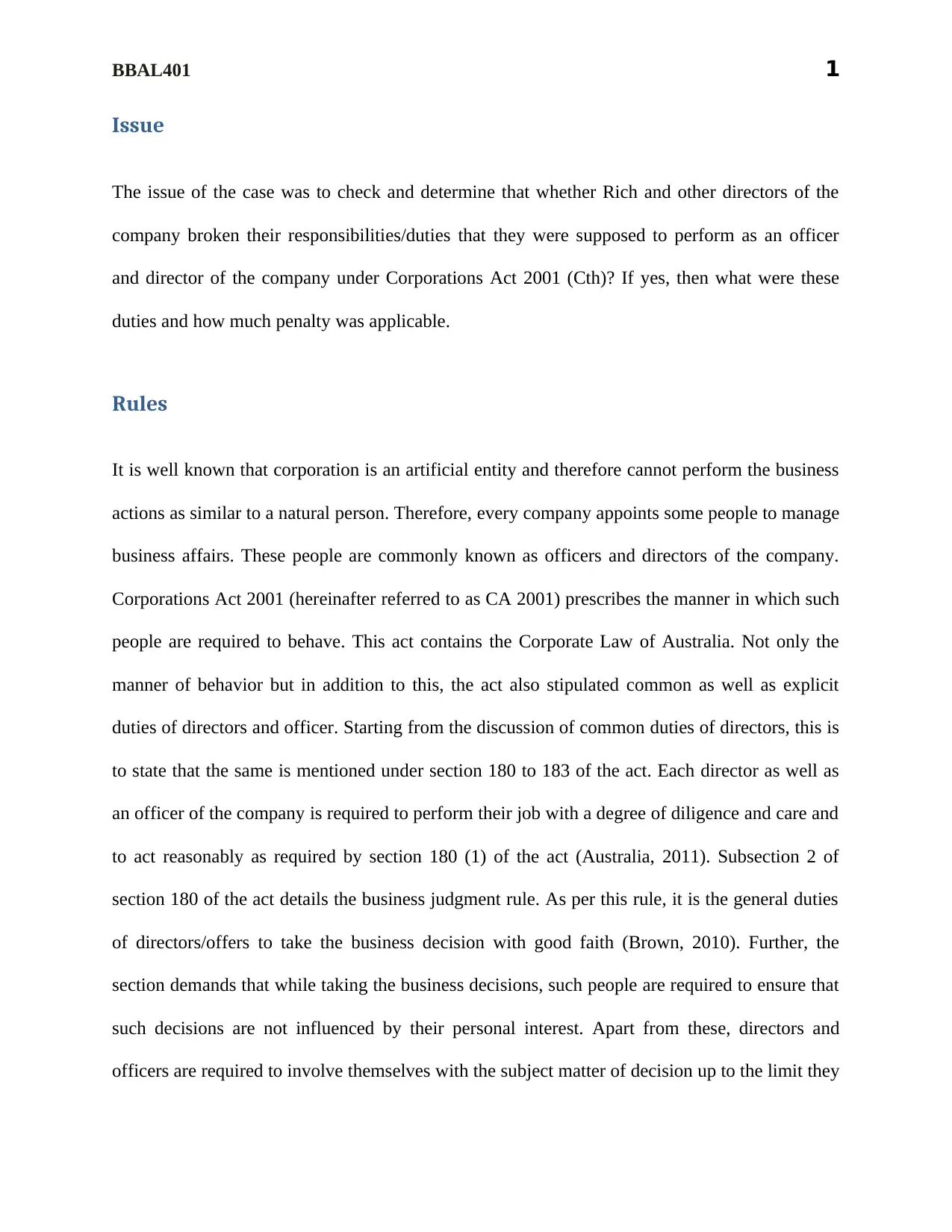
BBAL401 1
Issue
The issue of the case was to check and determine that whether Rich and other directors of the
company broken their responsibilities/duties that they were supposed to perform as an officer
and director of the company under Corporations Act 2001 (Cth)? If yes, then what were these
duties and how much penalty was applicable.
Rules
It is well known that corporation is an artificial entity and therefore cannot perform the business
actions as similar to a natural person. Therefore, every company appoints some people to manage
business affairs. These people are commonly known as officers and directors of the company.
Corporations Act 2001 (hereinafter referred to as CA 2001) prescribes the manner in which such
people are required to behave. This act contains the Corporate Law of Australia. Not only the
manner of behavior but in addition to this, the act also stipulated common as well as explicit
duties of directors and officer. Starting from the discussion of common duties of directors, this is
to state that the same is mentioned under section 180 to 183 of the act. Each director as well as
an officer of the company is required to perform their job with a degree of diligence and care and
to act reasonably as required by section 180 (1) of the act (Australia, 2011). Subsection 2 of
section 180 of the act details the business judgment rule. As per this rule, it is the general duties
of directors/offers to take the business decision with good faith (Brown, 2010). Further, the
section demands that while taking the business decisions, such people are required to ensure that
such decisions are not influenced by their personal interest. Apart from these, directors and
officers are required to involve themselves with the subject matter of decision up to the limit they
Issue
The issue of the case was to check and determine that whether Rich and other directors of the
company broken their responsibilities/duties that they were supposed to perform as an officer
and director of the company under Corporations Act 2001 (Cth)? If yes, then what were these
duties and how much penalty was applicable.
Rules
It is well known that corporation is an artificial entity and therefore cannot perform the business
actions as similar to a natural person. Therefore, every company appoints some people to manage
business affairs. These people are commonly known as officers and directors of the company.
Corporations Act 2001 (hereinafter referred to as CA 2001) prescribes the manner in which such
people are required to behave. This act contains the Corporate Law of Australia. Not only the
manner of behavior but in addition to this, the act also stipulated common as well as explicit
duties of directors and officer. Starting from the discussion of common duties of directors, this is
to state that the same is mentioned under section 180 to 183 of the act. Each director as well as
an officer of the company is required to perform their job with a degree of diligence and care and
to act reasonably as required by section 180 (1) of the act (Australia, 2011). Subsection 2 of
section 180 of the act details the business judgment rule. As per this rule, it is the general duties
of directors/offers to take the business decision with good faith (Brown, 2010). Further, the
section demands that while taking the business decisions, such people are required to ensure that
such decisions are not influenced by their personal interest. Apart from these, directors and
officers are required to involve themselves with the subject matter of decision up to the limit they
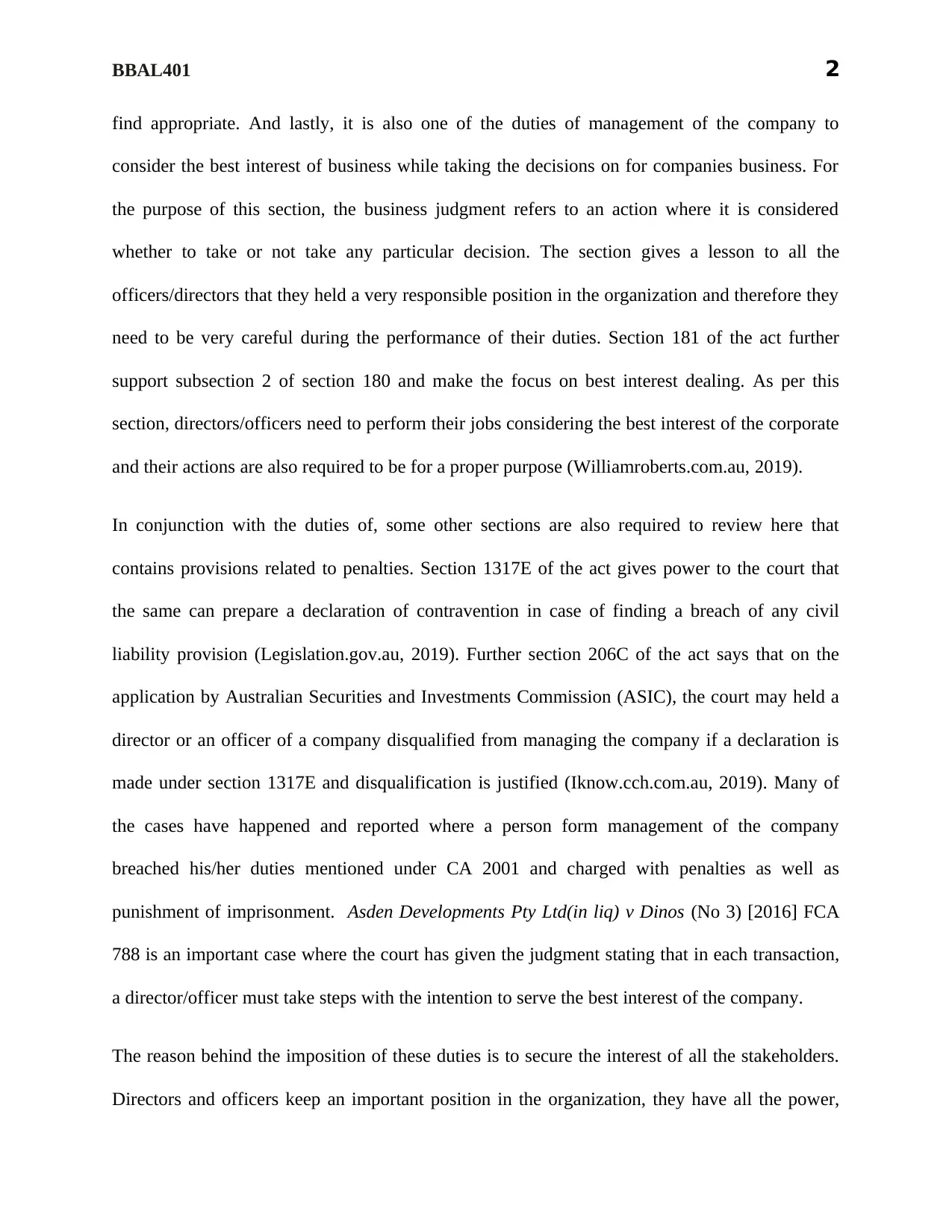
BBAL401 2
find appropriate. And lastly, it is also one of the duties of management of the company to
consider the best interest of business while taking the decisions on for companies business. For
the purpose of this section, the business judgment refers to an action where it is considered
whether to take or not take any particular decision. The section gives a lesson to all the
officers/directors that they held a very responsible position in the organization and therefore they
need to be very careful during the performance of their duties. Section 181 of the act further
support subsection 2 of section 180 and make the focus on best interest dealing. As per this
section, directors/officers need to perform their jobs considering the best interest of the corporate
and their actions are also required to be for a proper purpose (Williamroberts.com.au, 2019).
In conjunction with the duties of, some other sections are also required to review here that
contains provisions related to penalties. Section 1317E of the act gives power to the court that
the same can prepare a declaration of contravention in case of finding a breach of any civil
liability provision (Legislation.gov.au, 2019). Further section 206C of the act says that on the
application by Australian Securities and Investments Commission (ASIC), the court may held a
director or an officer of a company disqualified from managing the company if a declaration is
made under section 1317E and disqualification is justified (Iknow.cch.com.au, 2019). Many of
the cases have happened and reported where a person form management of the company
breached his/her duties mentioned under CA 2001 and charged with penalties as well as
punishment of imprisonment. Asden Developments Pty Ltd(in liq) v Dinos (No 3) [2016] FCA
788 is an important case where the court has given the judgment stating that in each transaction,
a director/officer must take steps with the intention to serve the best interest of the company.
The reason behind the imposition of these duties is to secure the interest of all the stakeholders.
Directors and officers keep an important position in the organization, they have all the power,
find appropriate. And lastly, it is also one of the duties of management of the company to
consider the best interest of business while taking the decisions on for companies business. For
the purpose of this section, the business judgment refers to an action where it is considered
whether to take or not take any particular decision. The section gives a lesson to all the
officers/directors that they held a very responsible position in the organization and therefore they
need to be very careful during the performance of their duties. Section 181 of the act further
support subsection 2 of section 180 and make the focus on best interest dealing. As per this
section, directors/officers need to perform their jobs considering the best interest of the corporate
and their actions are also required to be for a proper purpose (Williamroberts.com.au, 2019).
In conjunction with the duties of, some other sections are also required to review here that
contains provisions related to penalties. Section 1317E of the act gives power to the court that
the same can prepare a declaration of contravention in case of finding a breach of any civil
liability provision (Legislation.gov.au, 2019). Further section 206C of the act says that on the
application by Australian Securities and Investments Commission (ASIC), the court may held a
director or an officer of a company disqualified from managing the company if a declaration is
made under section 1317E and disqualification is justified (Iknow.cch.com.au, 2019). Many of
the cases have happened and reported where a person form management of the company
breached his/her duties mentioned under CA 2001 and charged with penalties as well as
punishment of imprisonment. Asden Developments Pty Ltd(in liq) v Dinos (No 3) [2016] FCA
788 is an important case where the court has given the judgment stating that in each transaction,
a director/officer must take steps with the intention to serve the best interest of the company.
The reason behind the imposition of these duties is to secure the interest of all the stakeholders.
Directors and officers keep an important position in the organization, they have all the power,
⊘ This is a preview!⊘
Do you want full access?
Subscribe today to unlock all pages.

Trusted by 1+ million students worldwide
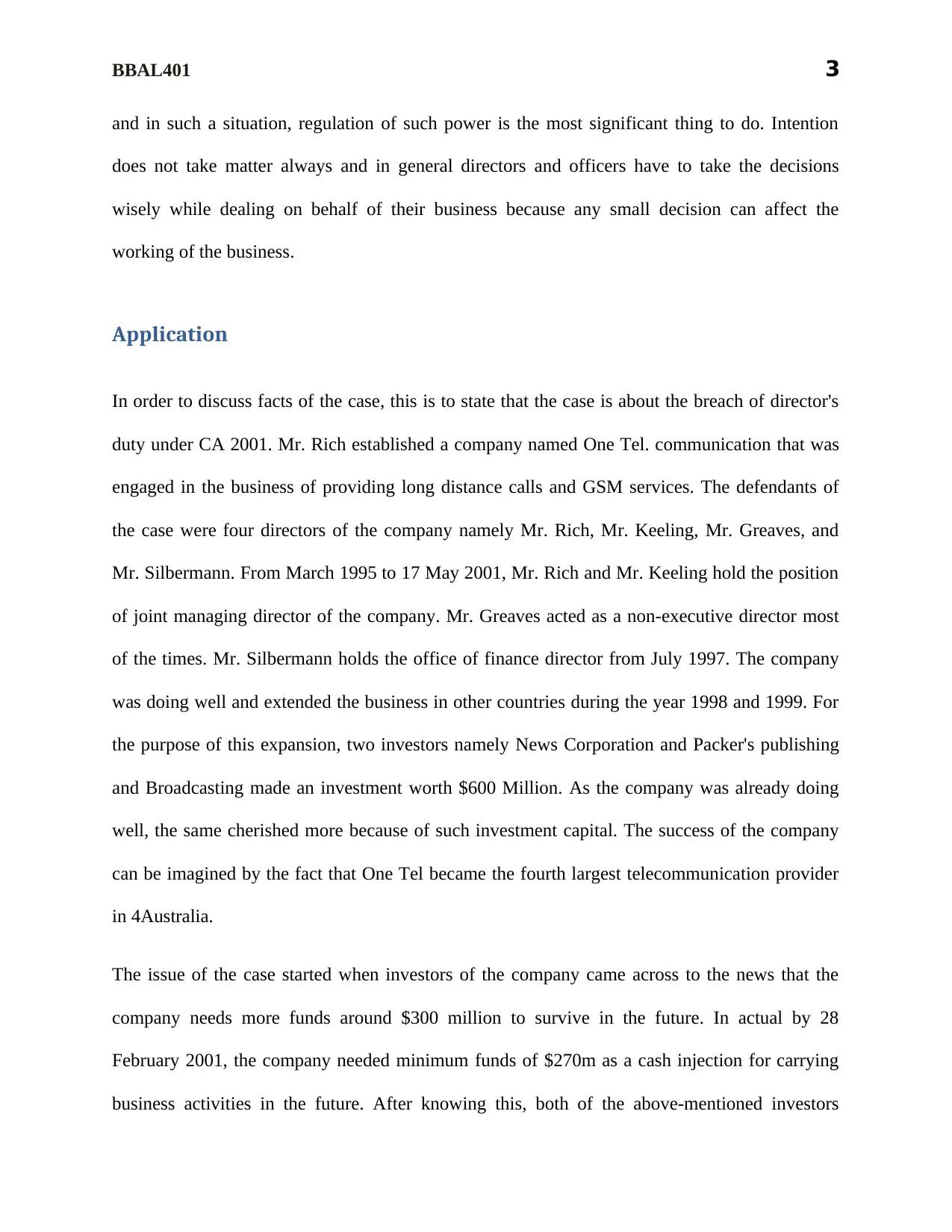
BBAL401 3
and in such a situation, regulation of such power is the most significant thing to do. Intention
does not take matter always and in general directors and officers have to take the decisions
wisely while dealing on behalf of their business because any small decision can affect the
working of the business.
Application
In order to discuss facts of the case, this is to state that the case is about the breach of director's
duty under CA 2001. Mr. Rich established a company named One Tel. communication that was
engaged in the business of providing long distance calls and GSM services. The defendants of
the case were four directors of the company namely Mr. Rich, Mr. Keeling, Mr. Greaves, and
Mr. Silbermann. From March 1995 to 17 May 2001, Mr. Rich and Mr. Keeling hold the position
of joint managing director of the company. Mr. Greaves acted as a non-executive director most
of the times. Mr. Silbermann holds the office of finance director from July 1997. The company
was doing well and extended the business in other countries during the year 1998 and 1999. For
the purpose of this expansion, two investors namely News Corporation and Packer's publishing
and Broadcasting made an investment worth $600 Million. As the company was already doing
well, the same cherished more because of such investment capital. The success of the company
can be imagined by the fact that One Tel became the fourth largest telecommunication provider
in 4Australia.
The issue of the case started when investors of the company came across to the news that the
company needs more funds around $300 million to survive in the future. In actual by 28
February 2001, the company needed minimum funds of $270m as a cash injection for carrying
business activities in the future. After knowing this, both of the above-mentioned investors
and in such a situation, regulation of such power is the most significant thing to do. Intention
does not take matter always and in general directors and officers have to take the decisions
wisely while dealing on behalf of their business because any small decision can affect the
working of the business.
Application
In order to discuss facts of the case, this is to state that the case is about the breach of director's
duty under CA 2001. Mr. Rich established a company named One Tel. communication that was
engaged in the business of providing long distance calls and GSM services. The defendants of
the case were four directors of the company namely Mr. Rich, Mr. Keeling, Mr. Greaves, and
Mr. Silbermann. From March 1995 to 17 May 2001, Mr. Rich and Mr. Keeling hold the position
of joint managing director of the company. Mr. Greaves acted as a non-executive director most
of the times. Mr. Silbermann holds the office of finance director from July 1997. The company
was doing well and extended the business in other countries during the year 1998 and 1999. For
the purpose of this expansion, two investors namely News Corporation and Packer's publishing
and Broadcasting made an investment worth $600 Million. As the company was already doing
well, the same cherished more because of such investment capital. The success of the company
can be imagined by the fact that One Tel became the fourth largest telecommunication provider
in 4Australia.
The issue of the case started when investors of the company came across to the news that the
company needs more funds around $300 million to survive in the future. In actual by 28
February 2001, the company needed minimum funds of $270m as a cash injection for carrying
business activities in the future. After knowing this, both of the above-mentioned investors
Paraphrase This Document
Need a fresh take? Get an instant paraphrase of this document with our AI Paraphraser
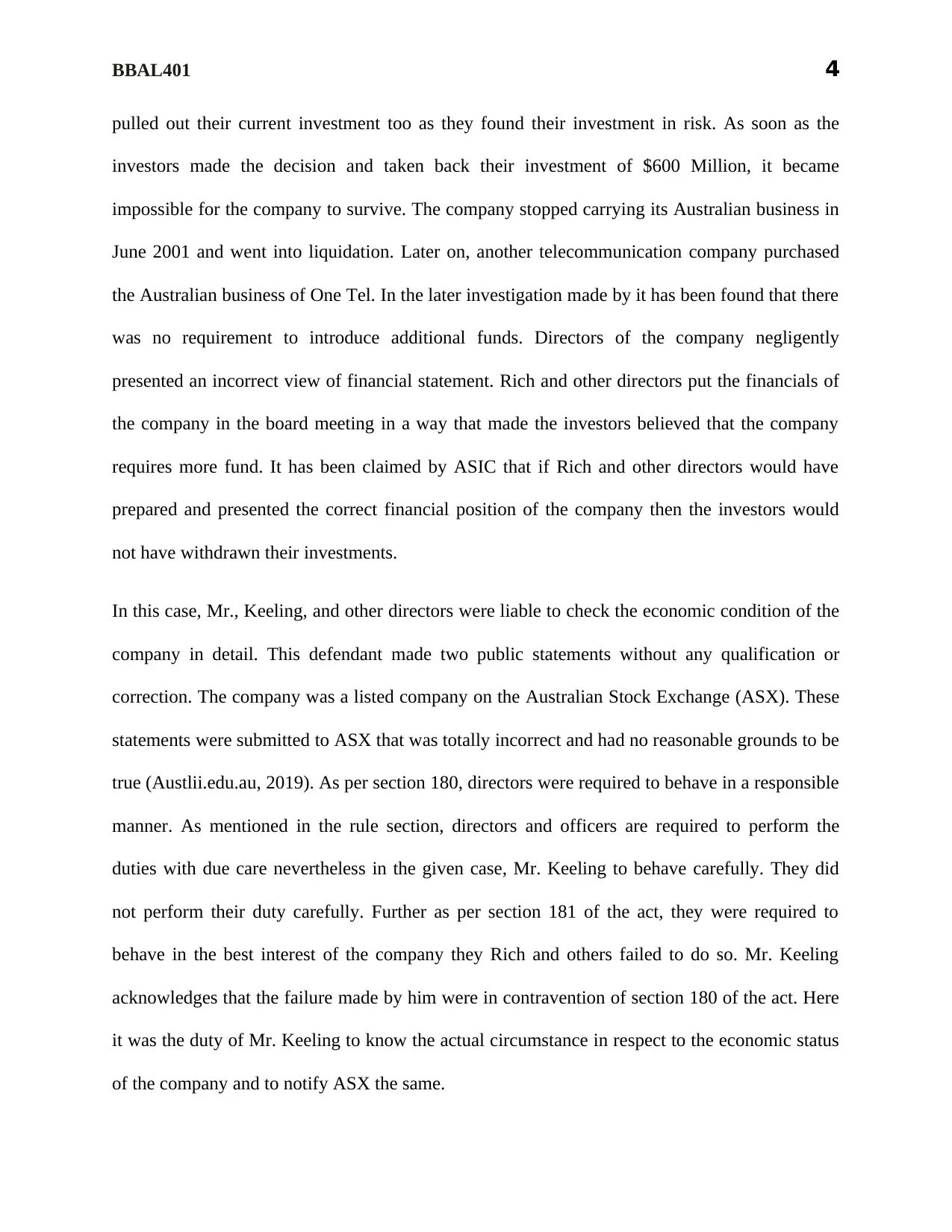
BBAL401 4
pulled out their current investment too as they found their investment in risk. As soon as the
investors made the decision and taken back their investment of $600 Million, it became
impossible for the company to survive. The company stopped carrying its Australian business in
June 2001 and went into liquidation. Later on, another telecommunication company purchased
the Australian business of One Tel. In the later investigation made by it has been found that there
was no requirement to introduce additional funds. Directors of the company negligently
presented an incorrect view of financial statement. Rich and other directors put the financials of
the company in the board meeting in a way that made the investors believed that the company
requires more fund. It has been claimed by ASIC that if Rich and other directors would have
prepared and presented the correct financial position of the company then the investors would
not have withdrawn their investments.
In this case, Mr., Keeling, and other directors were liable to check the economic condition of the
company in detail. This defendant made two public statements without any qualification or
correction. The company was a listed company on the Australian Stock Exchange (ASX). These
statements were submitted to ASX that was totally incorrect and had no reasonable grounds to be
true (Austlii.edu.au, 2019). As per section 180, directors were required to behave in a responsible
manner. As mentioned in the rule section, directors and officers are required to perform the
duties with due care nevertheless in the given case, Mr. Keeling to behave carefully. They did
not perform their duty carefully. Further as per section 181 of the act, they were required to
behave in the best interest of the company they Rich and others failed to do so. Mr. Keeling
acknowledges that the failure made by him were in contravention of section 180 of the act. Here
it was the duty of Mr. Keeling to know the actual circumstance in respect to the economic status
of the company and to notify ASX the same.
pulled out their current investment too as they found their investment in risk. As soon as the
investors made the decision and taken back their investment of $600 Million, it became
impossible for the company to survive. The company stopped carrying its Australian business in
June 2001 and went into liquidation. Later on, another telecommunication company purchased
the Australian business of One Tel. In the later investigation made by it has been found that there
was no requirement to introduce additional funds. Directors of the company negligently
presented an incorrect view of financial statement. Rich and other directors put the financials of
the company in the board meeting in a way that made the investors believed that the company
requires more fund. It has been claimed by ASIC that if Rich and other directors would have
prepared and presented the correct financial position of the company then the investors would
not have withdrawn their investments.
In this case, Mr., Keeling, and other directors were liable to check the economic condition of the
company in detail. This defendant made two public statements without any qualification or
correction. The company was a listed company on the Australian Stock Exchange (ASX). These
statements were submitted to ASX that was totally incorrect and had no reasonable grounds to be
true (Austlii.edu.au, 2019). As per section 180, directors were required to behave in a responsible
manner. As mentioned in the rule section, directors and officers are required to perform the
duties with due care nevertheless in the given case, Mr. Keeling to behave carefully. They did
not perform their duty carefully. Further as per section 181 of the act, they were required to
behave in the best interest of the company they Rich and others failed to do so. Mr. Keeling
acknowledges that the failure made by him were in contravention of section 180 of the act. Here
it was the duty of Mr. Keeling to know the actual circumstance in respect to the economic status
of the company and to notify ASX the same.
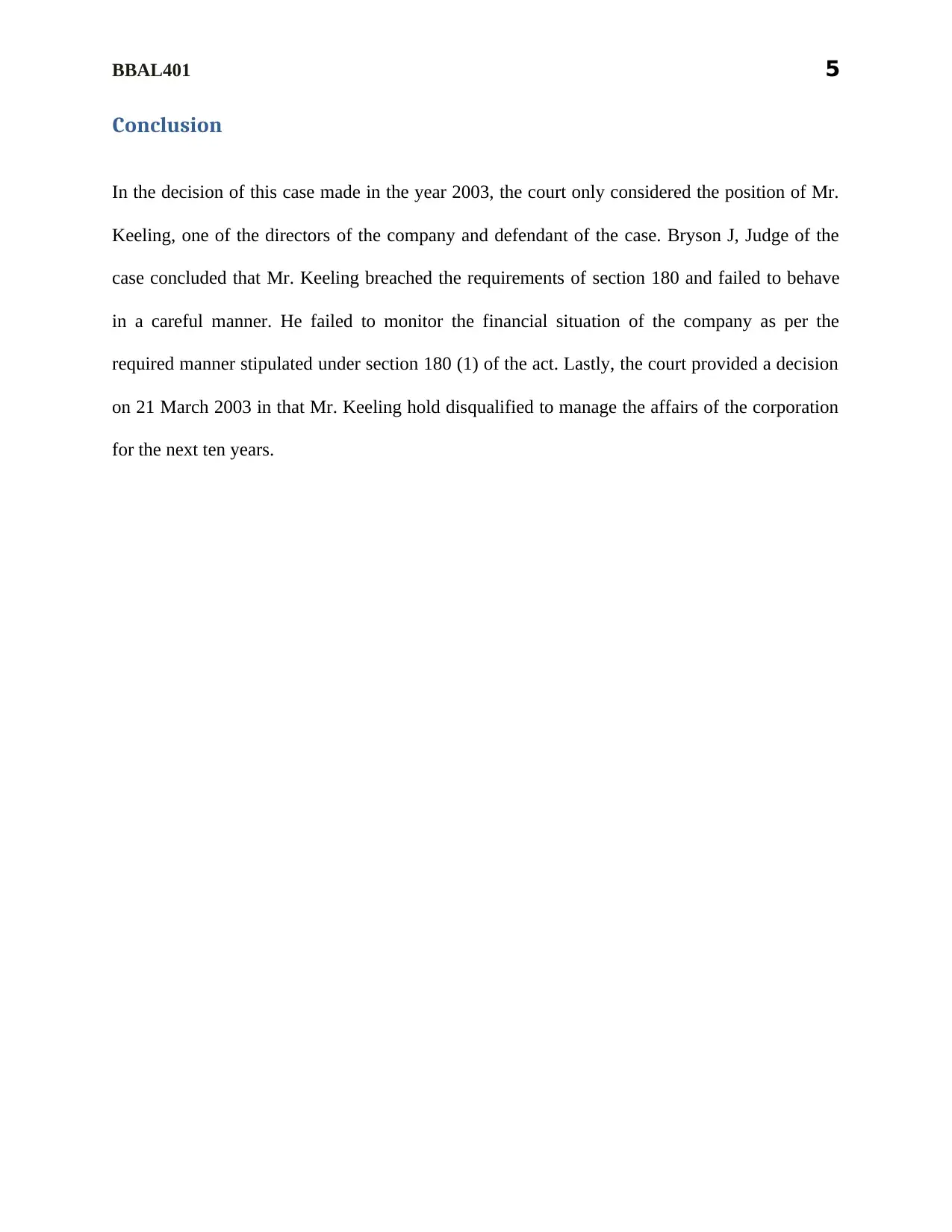
BBAL401 5
Conclusion
In the decision of this case made in the year 2003, the court only considered the position of Mr.
Keeling, one of the directors of the company and defendant of the case. Bryson J, Judge of the
case concluded that Mr. Keeling breached the requirements of section 180 and failed to behave
in a careful manner. He failed to monitor the financial situation of the company as per the
required manner stipulated under section 180 (1) of the act. Lastly, the court provided a decision
on 21 March 2003 in that Mr. Keeling hold disqualified to manage the affairs of the corporation
for the next ten years.
Conclusion
In the decision of this case made in the year 2003, the court only considered the position of Mr.
Keeling, one of the directors of the company and defendant of the case. Bryson J, Judge of the
case concluded that Mr. Keeling breached the requirements of section 180 and failed to behave
in a careful manner. He failed to monitor the financial situation of the company as per the
required manner stipulated under section 180 (1) of the act. Lastly, the court provided a decision
on 21 March 2003 in that Mr. Keeling hold disqualified to manage the affairs of the corporation
for the next ten years.
⊘ This is a preview!⊘
Do you want full access?
Subscribe today to unlock all pages.

Trusted by 1+ million students worldwide
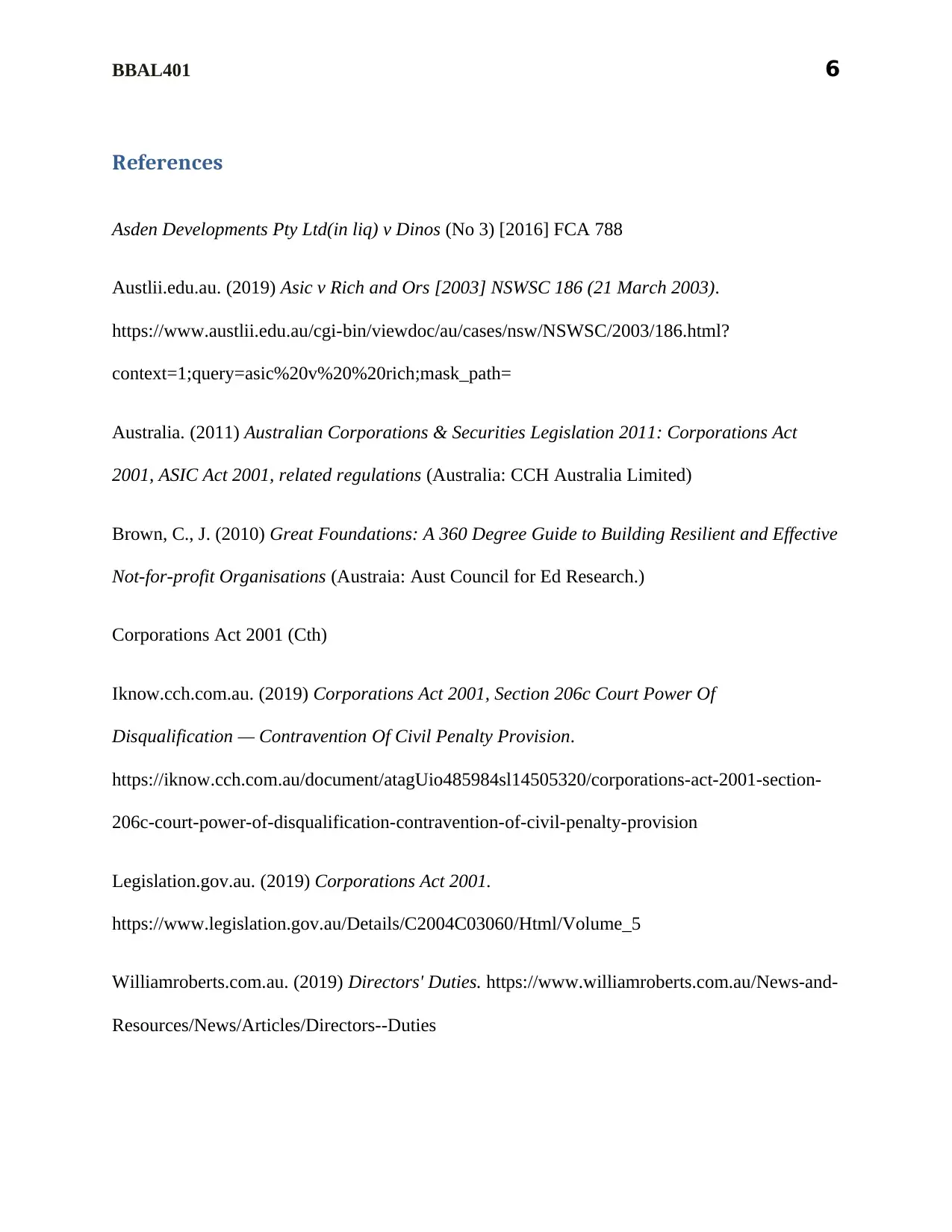
BBAL401 6
References
Asden Developments Pty Ltd(in liq) v Dinos (No 3) [2016] FCA 788
Austlii.edu.au. (2019) Asic v Rich and Ors [2003] NSWSC 186 (21 March 2003).
https://www.austlii.edu.au/cgi-bin/viewdoc/au/cases/nsw/NSWSC/2003/186.html?
context=1;query=asic%20v%20%20rich;mask_path=
Australia. (2011) Australian Corporations & Securities Legislation 2011: Corporations Act
2001, ASIC Act 2001, related regulations (Australia: CCH Australia Limited)
Brown, C., J. (2010) Great Foundations: A 360 Degree Guide to Building Resilient and Effective
Not-for-profit Organisations (Austraia: Aust Council for Ed Research.)
Corporations Act 2001 (Cth)
Iknow.cch.com.au. (2019) Corporations Act 2001, Section 206c Court Power Of
Disqualification — Contravention Of Civil Penalty Provision.
https://iknow.cch.com.au/document/atagUio485984sl14505320/corporations-act-2001-section-
206c-court-power-of-disqualification-contravention-of-civil-penalty-provision
Legislation.gov.au. (2019) Corporations Act 2001.
https://www.legislation.gov.au/Details/C2004C03060/Html/Volume_5
Williamroberts.com.au. (2019) Directors' Duties. https://www.williamroberts.com.au/News-and-
Resources/News/Articles/Directors--Duties
References
Asden Developments Pty Ltd(in liq) v Dinos (No 3) [2016] FCA 788
Austlii.edu.au. (2019) Asic v Rich and Ors [2003] NSWSC 186 (21 March 2003).
https://www.austlii.edu.au/cgi-bin/viewdoc/au/cases/nsw/NSWSC/2003/186.html?
context=1;query=asic%20v%20%20rich;mask_path=
Australia. (2011) Australian Corporations & Securities Legislation 2011: Corporations Act
2001, ASIC Act 2001, related regulations (Australia: CCH Australia Limited)
Brown, C., J. (2010) Great Foundations: A 360 Degree Guide to Building Resilient and Effective
Not-for-profit Organisations (Austraia: Aust Council for Ed Research.)
Corporations Act 2001 (Cth)
Iknow.cch.com.au. (2019) Corporations Act 2001, Section 206c Court Power Of
Disqualification — Contravention Of Civil Penalty Provision.
https://iknow.cch.com.au/document/atagUio485984sl14505320/corporations-act-2001-section-
206c-court-power-of-disqualification-contravention-of-civil-penalty-provision
Legislation.gov.au. (2019) Corporations Act 2001.
https://www.legislation.gov.au/Details/C2004C03060/Html/Volume_5
Williamroberts.com.au. (2019) Directors' Duties. https://www.williamroberts.com.au/News-and-
Resources/News/Articles/Directors--Duties
1 out of 7
Related Documents
Your All-in-One AI-Powered Toolkit for Academic Success.
+13062052269
info@desklib.com
Available 24*7 on WhatsApp / Email
![[object Object]](/_next/static/media/star-bottom.7253800d.svg)
Unlock your academic potential
Copyright © 2020–2026 A2Z Services. All Rights Reserved. Developed and managed by ZUCOL.



![Analysis of Director's Duties: ASIC v. Rich [2009] NSWSC 1229](/_next/image/?url=https%3A%2F%2Fdesklib.com%2Fmedia%2Fasic-v-rich-case-analysis_page_1.jpg&w=256&q=75)
![Analysis of ASIC V. RICH [2003] Case on Corporations Act Section 180](/_next/image/?url=https%3A%2F%2Fdesklib.com%2Fmedia%2Fasic-rich-analysis-corporations-act_page_2.jpg&w=256&q=75)
